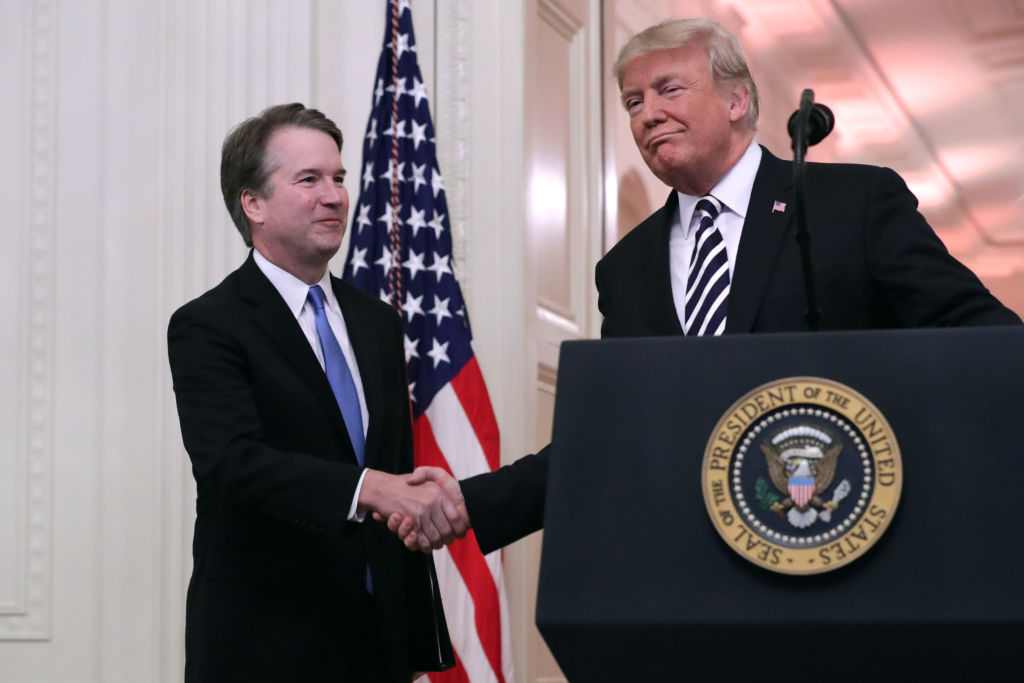
It wasn’t what Donald Trump expected from the conservative majority on the Supreme Court that he helped install. On Thursday, the court swiftly rejected the former President’s emergency request to expand the work of the special master reviewing documents seized by the FBI at his Mar-a-Lago Club to include classified files found there. The rebuff marked an additional setback in Trump’s efforts to slow down and delay the Justice Department’s criminal investigation into his potential mishandling of government documents.
The order was a single sentence, and didn’t disclose whether any justices objected to the decision, but it was yet another instance in the past two years in which Trump asked the court to protect his interests and was denied.
In December 2020, the Supreme Court tossed out a Texas lawsuit challenging Trump’s election losses in Georgia, Pennsylvania, Michigan and Wisconsin. In February 2021, a month after Joe Biden had been inaugurated as President, the court officially dismissed a raft of election lawsuits from Trump and his allies in several battleground states. That same month, the court rejected Trump’s attempt to block his tax records and other financial records from the Manhattan district attorney’s office investigating potential tax violations by Trump and the Trump Organization.
Then in January of this year, the Supreme Court refused Trump’s request to block the release of Trump White House records held at the National Archives to the Jan. 6 committee. In that case, Justice Clarence Thomas broke with the other justices and wrote publicly he would have granted Trump’s request for the court to hear the case.
With each decision, the court sent a message that giving Trump political protection was not a priority. “The former president perhaps has mistaken his ability to appoint justices to the court with an ability to control the court,” says Melissa Murray, a constitutional law professor at New York University School of Law.
Even if the court isn’t operating as the get-out-of-jail-free card Trump hoped it would, there’s little doubt that his presidency transformed the pinnacle of the nation’s judicial branch. The three justices Trump ushered onto the bench—Neil Gorsuch, Brett Kavanaugh and Amy Coney Barrett—have presided over a sweeping ideological shift to the right in the court’s decision making. In quick order, the new conservative majority has eliminated a 50-year constitutional right to abortion, made it more difficult to regulate guns, and curtailed the Environmental Protection Agency’s power to curb emissions contributing to climate change.
But those conservative policy victories haven’t quelled Trump’s indignation at the court not giving him more personal deference.
“He thinks that people should be loyal to him and not the rule of law,” says Jessica Levinson, a constitutional law professor at Loyola Law School. “What I view the Supreme Court as doing is carrying the water of the conservative movement and the Federalist Society, but that is different from carrying Donald Trump’s water.”
Read more: The Major Ongoing Investigations Into Donald Trump
The heat of Trump’s anger with the court’s conservative wing spilled into public view on Thursday, when Secret Service emails obtained by the Jan. 6 committee described Trump as “livid” when the Supreme Court failed to take up Texas’s request to challenge the election results in four battleground states. “Just fyi. POTUS is pissed – breaking news – Supreme Court denied his law suit. He is livid now,” read a quickly-tapped out email from a secret service agent warning others protecting Trump about his angry reaction.
Cassidy Hutchinson, former aide to White House chief of staff Mark Meadows, told the committee she saw Trump’s anger at the Supreme Court’s decision first hand. She recalled walking along the Rose Garden colonnade back toward the Oval Office after an evening Christmas reception when they crossed paths with Trump, who was “fired up” about the Supreme Court decision. She told the committee that she heard Trump “raging about the decision, and how it’s wrong, and, ‘Why didn’t we make more calls?’” Trump told Meadows, she said, “something to the effect of, ‘I don’t want people to know we lost, Mark. This is embarrassing. Figure it out. We need to figure it out. I don’t want people to know that we lost.’”
Thursday’s Supreme Court decision stymies an effort by Trump to stop the FBI from using the 100 classified files allegedly found in Trump’s possession in its investigation into the mishandling of government documents. But he may find himself appealing to the court again in the coming months. Around the time the court issued its decision, the Jan. 6 committee voted unanimously to take the rare step of subpoenaing a former President. The committee said it wants Trump to testify about his role in the events leading up to the violent breach of the Capitol Building. Trump is also facing ongoing investigations in Georgia and New York, and by the Justice Department, any of which could make demands on him that he could try appealing to the Supreme Court to help him sidestep.
“He has really effectively transformed the Supreme Court in a way that allows them to carry out his policy but not necessarily his personal politics,” Levinson said.
More Must-Reads from TIME
- Donald Trump Is TIME's 2024 Person of the Year
- Why We Chose Trump as Person of the Year
- Is Intermittent Fasting Good or Bad for You?
- The 100 Must-Read Books of 2024
- The 20 Best Christmas TV Episodes
- Column: If Optimism Feels Ridiculous Now, Try Hope
- The Future of Climate Action Is Trade Policy
- Merle Bombardieri Is Helping People Make the Baby Decision
Contact us at letters@time.com